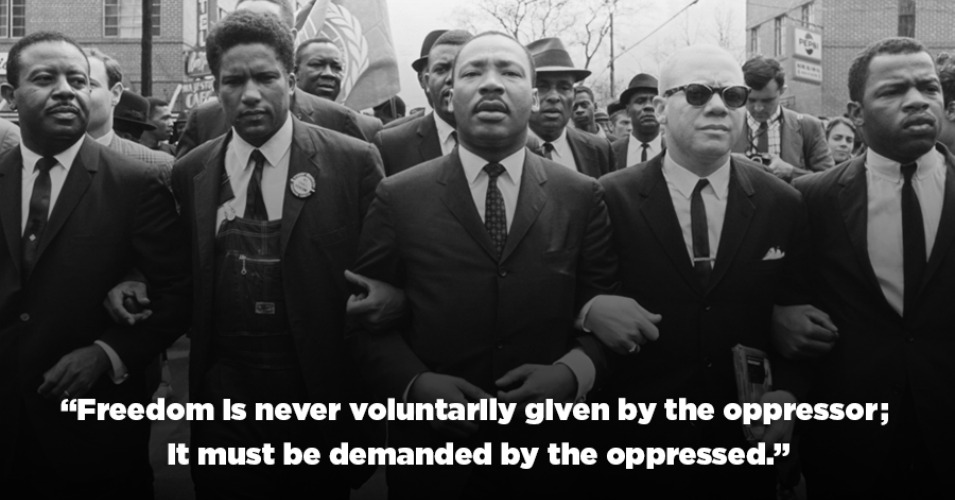Remembering MLK & the Bold, Radical and Uncompromising Civil Rights Movement

This Martin Luther King, Jr. Day Ferguson Action has called on its allies and supporters to #ReclaimMLK and lift up the “bold” vision of the “radical, principled and uncompromising” Civil Rights Movement. They remind us,
“The freedom fighters attached to this vision did not bow to political expediency or the calls for gradualism heard in their day… They were called impractical, rash, not strategic, irrational, and naive.”
What are the “impractical,” “rash” and “naive” demands we must make today to continue this legacy? How do we demand – as they did – the dismantling of all the structures that diminish our individual and collective humanity and build new ones rooted in human rights values?
To start, we must understand the entangled relationship between state sanctioned violence, physical and economic violence. The original stop and frisk may very well have been our country’s slave patrols, assisting in the extracting of unpaid labor through the use of violence and force. The current expression of this history we now refer to as “broken windows” policing for “keeping order” by continually harassing primarily low-income communities of color for minor or presumed offenses. This has led to the shocking deaths of Michael Brown, Eric Garner and far too many others, as well as separation of families through unjustifiable levels of arrest and incarceration and mass barriers to employment for those burdened with criminal records.
To add insult to these already deep injuries, municipalities rely on this style of policing as a revenue stream to balance public budgets. As the NYPD’s recent work slow down brought to attention, the city raises $800 million of its annual budget from court, criminal and administrative fines (for minor “broken windows” offenses such as loitering) that fall disproportionately on communities of color. Smaller cities with majority Black Communities draw up to 30% of their revenue from punitive penalties on low-income communities of color, compared to around 7% from White communities. At times, municipalities intentionally increase fines to meet budget shortfalls ultimately feeding a vicious cycle of poverty as people who can’t pay for fines skip court and then face arrests that upend their lives.
These punitive actions by the state are one of the many factors that have fed the racial wealth gap we see today. The racial wealth gap – where on average White families have 12x the wealth of Black families and 9.5x the wealth of Latino families – magnifies for communities of color the already extreme economic inequality from which the entire country is suffering. Public budgets, rather than addressing these glaring inequalities, intensify them by directing massive resources to harsh and punitive tactics while depriving all communities needing support. New York City, for example, is willing to spend $168,000 to incarcerate a young person for one year, yet only $19,076 dollars annually on one student’s education.
These harmful dynamics are paired with a failure to tax equitably to meet basic human rights obligations, with low-income people paying a much higher share of their income in taxes than the wealthy. Is it naive, rash and impractical to expect that we raise the public revenue required to meet people’s needs in an equitable and transparent way, and refrain from extracting funds from the poor through punitive approaches? Is it equally naive, rash and impractical to expect that we use public resources to ensure the human rights and well-being of everyone?
Demanding an end to current police practices and calling for a needs-based People’s Budget that raises revenue justly and is grounded and shaped by human rights values is a start to ending the interrelated economic exploitation and state violence we see today. They are both necessary to ensuring our human rights to decent jobs, education, a basic income, health care justice and adequate housing for all people. Dr. Martin Luther King, Jr. and the many who worked with him became the embodiment of a human rights vision for their time, and today we must honor them by following suit.

